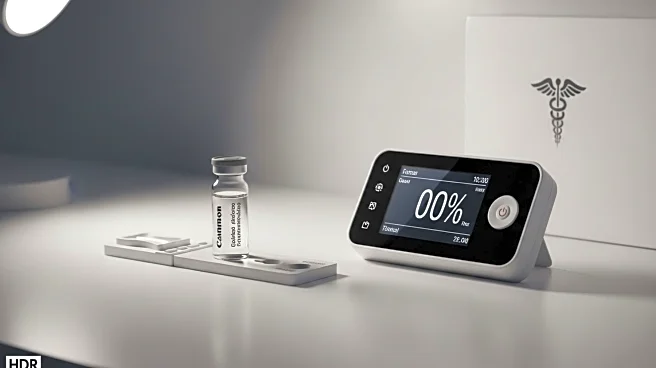What is the story about?
What's Happening?
Eli Health, a health tech startup, has introduced the Hormometer, an at-home system designed for real-time hormone tracking, focusing primarily on cortisol, the body's primary stress hormone. This innovation allows users to track their hormone levels using a small saliva sample, which is then analyzed through a smartphone app. The results are available within 20 minutes, eliminating the need for blood work or lab visits. The Hormometer aims to make hormone tracking as accessible as monitoring sleep or glucose levels. Eli Health's cofounder and CEO, Marina Pavlovic Rivas, highlighted the importance of this tool in helping individuals understand the role of hormones in their health, particularly for those experiencing symptoms like fatigue or mood shifts. The device is FDA-registered for cortisol and progesterone testing, although it has not undergone full FDA review for safety and effectiveness.
Why It's Important?
The introduction of the Hormometer represents a significant advancement in personal health monitoring, particularly for those dealing with hormone-related health issues. By providing an accessible and non-invasive method to track cortisol levels, the device could help individuals better manage stress and its associated health impacts. This is particularly relevant given that many adults experience hormone dysregulation, which can affect mood, metabolism, and overall well-being. The Hormometer's ability to provide immediate, actionable insights could empower users to make informed decisions about their health, potentially reducing the need for frequent doctor visits and associated healthcare costs. Furthermore, the device's integration with existing health monitoring technologies, like smartwatches, could offer a more comprehensive view of an individual's health.
What's Next?
Following the launch of the cortisol-focused Hormometer, Eli Health plans to expand its hormone testing capabilities to include progesterone later this year and testosterone early next year. This expansion could further enhance the device's utility for a broader range of users, particularly those interested in tracking reproductive health or managing conditions like polycystic ovary syndrome (PCOS). As the device gains traction, it may prompt further innovation in the field of at-home health monitoring, potentially leading to the development of similar tools for other hormones or health metrics. The success of the Hormometer could also influence regulatory discussions around the approval and oversight of at-home medical devices.
Beyond the Headlines
The launch of the Hormometer raises important questions about the future of personal health data management and privacy. As more individuals gain access to detailed health metrics, there will be a growing need for secure data handling practices to protect sensitive information. Additionally, the device's reliance on AI for data analysis highlights the increasing role of technology in healthcare, which may lead to ethical considerations regarding the accuracy and reliability of AI-generated health insights. As the market for at-home health monitoring devices expands, there may also be implications for traditional healthcare models, potentially shifting some aspects of patient care from clinical settings to the home.















